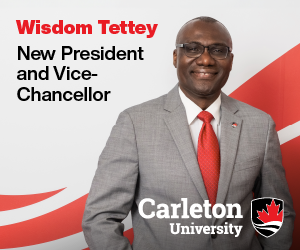Sharing your research with the public can change minds
A recent study finds evidence that thoughtful, persuasive commentary by academics can shift the debate and affect policy.

At a time when too many public conversations are dominated by the simplistic tweets of a powerful man with a legendary disregard for the truth, news about some recent research was especially welcome. It turns out that well-reasoned arguments featuring nuanced analysis of complex issues – the kind published in respected newspapers and online hubs – regularly persuade readers to embrace new ideas.
Despite the handwringing over fake news and the polarization of political views, this research finds that thoughtful commentary remains capable of changing minds. In a peer-reviewed study published in May, scholars from Yale University and the Cato Institute assessed how 3,500 Americans responded to reading randomly assigned op-eds. They found that general readers and policy professionals alike became strikingly more inclined to agree with the author whose views they read.
Citizens, the researchers concluded, “are capable of considering diverse views, absorbing facts and even changing their minds … the ‘other’ side is not immune to evidence and argument.”
This isn’t a surprise to anyone who’s had the privilege of writing a regular column. It’s true that during the three years I opined for the Vancouver Sun, I did occasionally receive religious tracts from readers who remained unmoved by my advocacy for gay teens or a woman’s right to choose. But I also heard from others whose perspectives – on hospitals dispensing infant formula, a judge recounting sexist jokes, or police treatment of cases involving missing Indigenous women – had shifted. And my newly convinced correspondents included foreign ambassadors and professors, business executives and homemakers.
Distinguished University of Ottawa legal scholar Elizabeth Sheehy has written dozens of op-eds on a range of criminal justice issues affecting women who’ve been victims of intimate partner violence. Years before the news broke of allegations against Jian Ghomeshi or Bill Cosby, Harvey Weinstein or Louis C.K., Professor Sheehy regularly drew attention to related matters. Learning of a new legal case with serious implications for how the justice system works, she would provide evidence-informed analysis to help the rest of us understand why it was important.
Last fall, the non-profit initiative I lead honoured her for this work – because it is work. To write a compelling and persuasive commentary, you need to research the facts, know the background, craft a clear and well-supported argument, solicit constructive feedback – and be able to withstand public criticism.
Professor Sheehy is well-acquainted with both the extra hours and the resulting hate mail. But she persists because, as she says, “I see speaking to the media as fundamental to research dissemination, as a public responsibility that comes with tenure.”
And that commitment has resulted in influence far beyond what one typically enjoys from publishing in academic journals alone. Indeed, Professor Sheehy’s media commentary was instrumental in drawing Canadian attention to the “Philadelphia model,” a more effective approach to dealing with sexual assault cases, which is now being adopted by police forces across this country.
Nor is she alone in inspiring attitude shifts or policy change. Publishing commentary in well-read news sources can reach hundreds of thousands of people, including senior decision-makers across sectors. As a result, other scholars in our network have seen their shared analysis translate into input on government fiscal policy, an appointment to an influential advisory committee, and funding for new research on a timely labour issue.
Take Wilfrid Laurier University health studies professor Janet McLaughlin. She wrote three commentaries that were published in the country’s best-read daily newspaper and by a popular online site. When excerpts were subsequently read aloud during Ontario parliamentary debates, they helped to change government legislation on the funding of autism treatment.
In contrast, according to an analysis conducted in 2015 by researchers at Oxford and the National University of Singapore, articles published in respected academic journals are read, on average, by no more than 10 people. You can probably guess the reasons flagged by the study’s authors. They noted that many journal articles feature incomprehensible jargon and are unnecessarily long. The journals themselves produce a staggering volume of material and are prohibitively costly.
Scholars looking for opportunities to actively contribute to public policy decisions in arenas touched by their research should take note. At a time of diminishing ad revenues and the stables of journalists they used to support, traditional news outlets are hungry for substantive content from qualified, independent sources.
And the introduction of The Conversation to Canada has made it easier than ever for scholars in this country to reach audiences beyond the ivory tower. An independent, not-for-profit media outlet, The Conversation employs professional journalists who help researchers translate context and analysis from the academic community into accessible commentary. Over the past year, dozens of the scholars we’ve trained have seen their insights disseminated to a broader public through creative commons republication from The Conversation’s website.
Like Professor Sheehy and Dr. McLaughlin above, many of them undoubtedly leveraged their evidence-based insights into educating citizens and changing minds. If your research is worth doing, isn’t it worth sharing in pursuit of something similar?
Shari Graydon is the founder and catalyst of Informed Opinions, a national non-profit working to bridge the gender gap in Canadian media by 2025.
Featured Jobs
- Electrical and Computer Engineering - Assistant/Associate ProfessorWestern University
- Indigenous Studies - Faculty PositionUniversité Laval
- Electrical Engineering - Assistant Professor (Electromagnetic/Photonic Devices and Systems)Toronto Metropolitan University
- Psychology - Assistant Professor (Social)Mount Saint Vincent University
- Accounting - Tenured or Tenure-Track Faculty PositionUniversity of Alberta















Post a comment
University Affairs moderates all comments according to the following guidelines. If approved, comments generally appear within one business day. We may republish particularly insightful remarks in our print edition or elsewhere.